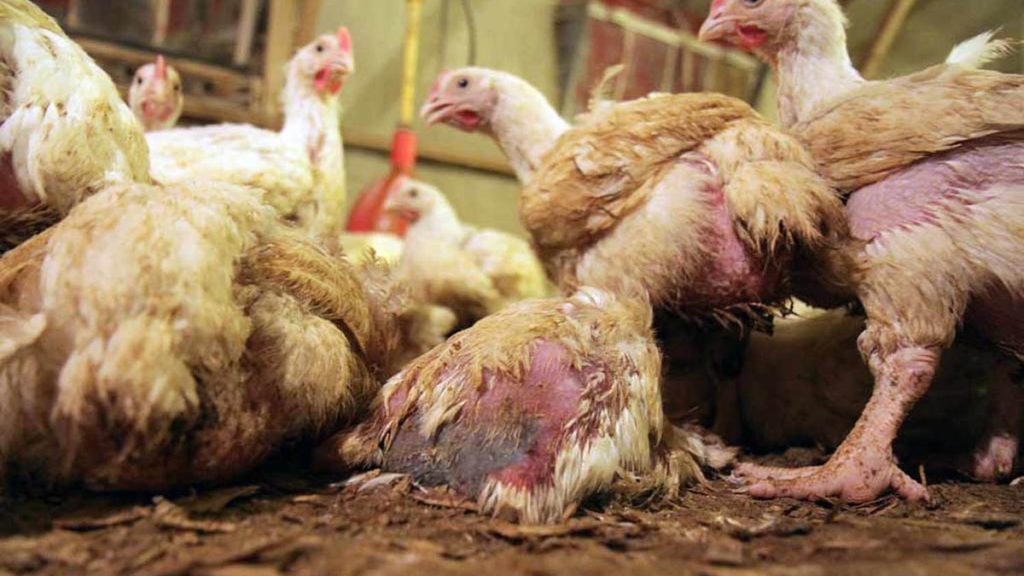Cheap Nature/Cheap Labor

There’s a concept pushed in recent years by environmental scholars that what capitalism does is create “cheap nature,” or the push to commodify the natural world in a way that rips through resources at unsustainable rates by creating systems that make them both inexpensive and completely disposable. This also applies to labor systems. The geographer Jason Moore is one of the people who have articulated this and you can read a slight bit more here.
A commenter highlighted this story about an egg factory in Iowa that is a great example of this really quite horrible part of our economy that reminded me very much of this idea:
Labourers at the one of the world’s largest egg factories arrived at the plant in Rembrandt, Iowa, early one morning in March to discover they were about to work themselves out of a job.As they gathered at the huge barns housing stacks of caged hens, the workers were told to forget about their usual routine of collecting eggs and feeding the birds. Overnight, the factory had begun slaughtering more than 5 million chickens using a gruesome killing method after detecting a single case of avian influenza. Even supervisors were assigned to the arduous task of dragging dead hens out of packed cages as Rembrandt Enterprises raced to contain the spread of the virus, amid the largest bird flu outbreak in the US in seven years.The culling has been repeated at chicken and turkey farms across Iowa and 28 other states from Maine to Utah. More than 22m birds have been killed in an attempt to contain the outbreak – the majority in Iowa, the US’s biggest producer of eggs. The slaughter of 5.3m hens at Rembrandt is the largest culling at any factory farm in the country.
Workers spent nearly a month pulling the dead poultry from the cages and dumping them in carts before they were piled high in nearby fields and buried in huge pits. The killing over, about 250 people were summarily thrown out of work with just a few dozen skeleton staff remaining.
In the weeks that followed, animal rights protesters targeted Rembrandt’s billionaire owner, Glen Taylor, over the cull, including disrupting games played by the professional basketball team he owns, the Minnesota Timberwolves. But few voices have been raised in support of Rembrandt’s workers, some of them undocumented migrants.
Others fired from the plant contrast the seriousness with which the bird flu outbreak has been taken by Rembrandt’s management to what they describe as the company’s lax approach to the threat to workers from Covid, as it swept through factory farms and slaughterhouses in Iowa and elsewhere.
“Right now everybody’s worried about the chickens,” said Oscar Garcia, a former supervisor at the plant. “We get it: it was really inhumane the way they killed them. But chickens are chickens, right? People worked in those barns pulling out dead birds in terrible conditions, faeces everywhere, doing 12- or 14-hour days.
“They couldn’t protest because then they’d be fired and lose their redundancy pay. Then they’re thrown out of work and no one speaks for them.”
So there’s a lot going on here, but we can break it down. First, a system that treats chickens so poorly that it will just roast them all alive to stop a disease that comes from the production of chicken under capitalism anyway is also going to metaphorically roast the workers alive too (although not always necessarily metaphorically given the horrible working conditions in contemporary meatpacking). This is the ultimate in cheap nature/cheap labor. Burn the chickens, fire the immigrant workers, who cares when we can watch Karl-Anthony Towns.
Moreover, I’m glad this article focused on the workers. To say the least, animal rights activists tend to not be good on labor issues. Most of the really intense pro-animal people I’ve met in my life happen to be pretty misanthropic when it comes to humans. So it’s hardly surprising. But we can’t really understand the totality of the meat system without understanding both the human and environmental costs of it. After all, each side of that equation relies on the other. You can’t have cheap nature without cheap labor and you can’t have cheap labor without cheap nature. The point of capitalism after all is to wrest profits from the Earth and the humans who live upon it by reducing costs on both to the greatest extent possible. The only thing that stops is that is the movements of workers and other people who demand better. Too often, we do not.
But hey, maybe the ticks will start affecting our ability to eat chicken like it does red meat……


